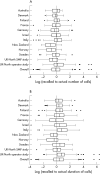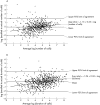Validation of short term recall of mobile phone use for the Interphone study
- PMID: 16556742
- PMCID: PMC2078087
- DOI: 10.1136/oem.2004.019281
Validation of short term recall of mobile phone use for the Interphone study
Abstract
Aim: To validate short term recall of mobile phone use within Interphone, an international collaborative case control study of tumours of the brain, acoustic nerve, and salivary glands related to mobile telephone use.
Methods: Mobile phone use of 672 volunteers in 11 countries was recorded by operators or through the use of software modified phones, and compared to use recalled six months later using the Interphone study questionnaire. Agreement between recalled and actual phone use was analysed using both categorical and continuous measures of number and duration of phone calls.
Results: Correlations between recalled and actual phone use were moderate to high (ranging from 0.5 to 0.8 across countries) and of the same order for number and duration of calls. The kappa statistic demonstrated fair to moderate agreement for both number and duration of calls (weighted kappa ranging from 0.20 to 0.60 across countries). On average, subjects underestimated the number of calls per month (geometric mean ratio of recalled to actual = 0.92, 95% CI 0.85 to 0.99), whereas duration of calls was overestimated (geometric mean ratio = 1.42, 95% CI 1.29 to 1.56). The ratio of recalled to actual use increased with level of use, showing underestimation in light users and overestimation in heavy users. There was substantial heterogeneity in this ratio between countries. Inter-individual variation was also large, and increased with level of use.
Conclusions: Volunteer subjects recalled their recent phone use with moderate systematic error and substantial random error. This large random error can be expected to reduce the power of the Interphone study to detect an increase in risk of brain, acoustic nerve, and parotid gland tumours with increasing mobile phone use, if one exists.
Conflict of interest statement
Competing interests: as stated above, the UICC received funding for Interphone from the Mobile Manufacturers' Forum and the GSM Association, and Interphone's complete scientific independence from these funders was guaranteed. The University of Leeds (authors: SJH, RCP, PAMcK) and the University of Lyon (author MH) received some financial support for the main Interphone study (not the validation study), from, respectively, the UK Network Operators (O2, Orange, T‐Mobile, Vodafone, ‘3') and French Network Operators (Orange, SFR, Bouygues) under legal signed contractual agreements which ensure complete independence for the scientific investigators. These funders had no involvement in the study design, data collection, statistical analysis or interpretation of the data, report writing, or decision to submit this paper. Individual authors have no competing interests to declare.
References
-
- Boice J D, MacLaughlin J K. Epidemiologic studies of cellular telephones and cancer risk. Stokholm Sweden: Swedish Radiation Protection Authority, 2002. (Publication no 2002, 16)
-
- Cardis E, Kilkenny M. International case‐control study of adult brain, head and neck tumours: results of the feasibility study. Radiat Prot Dosimetry 199983179–183.
-
- Cardis E, Kilkenny M. INTERPHONE International Case Control Study of Tumours of the Brain and Salivary Glands, Protocol rev 1, IARC Internal Report 01/002. Lyon: International Agency for Research on Cancer, 2001
Publication types
MeSH terms
LinkOut - more resources
Full Text Sources



